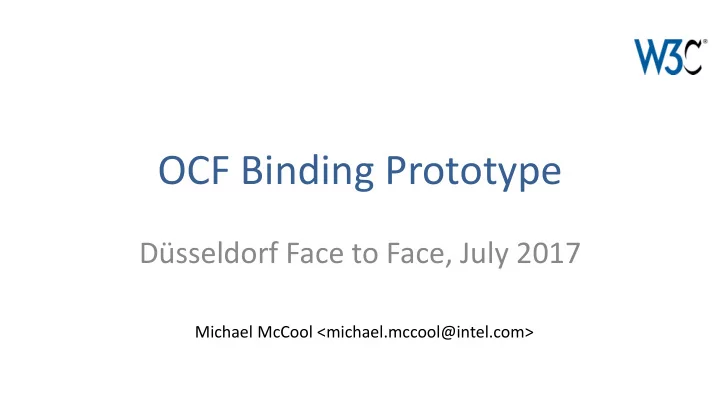

OCF Binding Prototype Düsseldorf Face to Face, July 2017 Michael McCool <michael.mccool@intel.com>
Outline • Prototype: – What was done – Architecture • Issues • Suggestions • Next steps 2
Goals • Consume OCF metadata • Output a Thing Description • Attempt automatic translation of metadata 3
Prototypes • ocf-bridge (not completed) – Consume OCF metadata, expose automatically generated WoT interface, translate dynamically to OCF interactions • ocf-generator – Consume OCF metadata, produce TD describing available resources and interactions • ocf-client (partial) – Consume and test TD generated by ocf-generator; allow interaction with OCF devices through WoT scripting API 4
Architecture • Need to extract OCF metadata from multiple sources and integrate – Instance metadata: /oic/res/, /oic/d, introspection – Type metadata: JSON-schema, RAML – Standard metadata: OCF standard • Some additional hand-written metadata required per OCF “resource type” still needed – Annotation metadata 5
Annotation Metadata • Semantic tagging – For example, oic.rt.light => ocf:Light • Which resource types should be exposed – Some are OCF-specific metadata • Which combinations of interfaces make sense • Actions and Events – OCF technically only has “properties” • Names and writable properties – Name and “writable” annotations don’t match up exactly with how this is done in TDs 6
Annotation Example [.. "outputData": { "oic.r.switch.binary": { "properties": { "writable": false, "ID": {"type": "string"}, "method": "r", "VALUE": {"type": "boolean"} "protocolContent": { }, "http": "application/json", "templateType": "coap": "application/cbor" "application/json", }, "template": "{\"id\":\"{{ID}}\",\"value\":{{VA LUE}}}" } },…] 7
TD Example (one Interaction) […{ "@type": ["Property"," ocf:Resource"], "name": "batchlight", "ocf:di": "47ffbddf-37d1-4f39-95f5-d3ba2fcf2c92", "ocf:n": "batch light", "link": [{ "ocf:icv": "core.1.1.0", "href":"http://192.168.1.127:8000/api/oic/light?di=47ffbddf- 37d1-4f39-95f5-d3ba2fcf2c92", "writable": false, "coap:rt": ["oic.r.switch.binary"], "outputData": { "coap:if": ["oic.if.baseline"], "valueType": {"type":"object"}, "ocf:p": { "ocf:bm":3, "properties": { "ocf:secure":false "ID":{"type":"string"}, }, "VALUE":{"type":"boolean"} "mediaType": "application/json", "driver": "ocf", } “ outputData": { } "templateType": ["application/json"], },…] "template”: [ “{ \ ”id \ ”:{{ID}}, \"value\":{{VALUE }}}“ ]} }], 8
Prototype Limitations • Some data available at oneIoTA.org in JSON-Schema and RAML was entered manually in annotation metadata – Should define a separate program, an “ ocf- gatherer”, to collect and translate this information – Only needs to be done once per spec, mostly – Except for vendor extensions… • Doesn’t handle CoAP yet • Doesn’t deal with multiple rt/if combinations • Includes some unnecessary “OCF internal” resources in the output • Combines all OCF devices on the local network into one big Thing (leading to potential name collisions) • Not really aligned with MK’s current P.B. proposal… 9
Issues • Names in OCF properties may not map to unique names needed for WoT interface – Led to an issue with actually using Scripting API • OCF di’s need to be embedded in URIs but are not consistent from run to run • Semantic tagging used but context file not defined – Need to work on OCF and CoAP semantic models • Resource directory groups all resources together, need to be re-grouped and split out again as separate Things 10
Suggestions • Protocol binding templates as strings • Separate template media type (which should be encoded as a string, eg JSON) that can be converted to wire media type (which might be binary, eg CBOR) • Alternatives: – Make template always be JSON – Get rid of template and make it equivalent to parameter map, eg. make generation of payload the full responsibility of the driver • Add additional “driver” parameter so that target device ecosystem ( eg ocf) can be identified – May not be able to infer from protocol, eg http:// or coap:// – May be special behaviors or exceptions that need to be dealt with in the driver • Encode raw metadata (optionally…) in TD using ocf: prefix – Of possible use to reasoner/planner systems, or to driver 11
Next Steps • Update to intercept protocol binding proposal • Implement protocol binding templates – E.g. using moustache and reverse-moustache – If we decide we actually need them… • Implement ocf-gather to ingest existing OCF type metadata • Additional semantic annotation mechanisms • Pull request on node-wot • Try some other IoT standards… 12
Conclusions • Automatic mapping possible – Mostly; with a small amount of additional metadata to fill in a few blanks • But OCF is a relatively easy case – Web-API-ish, REST-y • We really need to repeat this exercise with additional standards 13
Recommend
More recommend